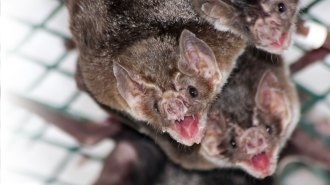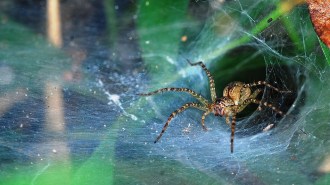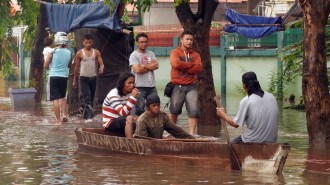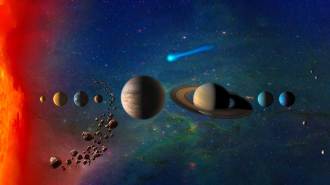News
-
 Life
LifeVampire bat friendships endure from captivity to the wild
Vampire bats can form social bonds that persist from a lab setting to the outdoors, suggesting the cooperative relationships are like friendships.
-
 Science & Society
Science & SocietyAlaska’s free money for residents hints at how universal basic income may work
Since 1982, Alaskans have gotten an annual oil dividend. Scientists say that program hints at the pros and cons of a universal basic income.
By Sujata Gupta -
 Animals
AnimalsSpider webs don’t rot easily and scientists may have figured out why
Spider silk doesn’t rot quickly because bacteria can’t access its nitrogen, a nutrient needed for the microbes’ growth, scientists say.
-
 Climate
ClimateA new estimate triples the number of people in the path of rising seas
Sea level rise could flood coastal areas now home to 340 million to 480 million people by 2100, with Asia most affected, a study finds.
By Sofie Bates -
 Space
SpaceRules guarding other planets from contamination may be too strict
Voluntary international guidelines for visiting the moon, Mars and other places — and for bringing stuff back to Earth — are overly cautious, scientists say.
-
 Humans
HumansHumans’ maternal ancestors may have arisen 200,000 years ago in southern Africa
New DNA findings on humankind’s maternal roots don’t offer a complete picture of how and when Homo sapiens emerged.
By Bruce Bower -
 Life
LifeBird eggs laid in cold climates are darker, which may keep eggs warm
A global survey of bird egg color reveals a simple trend: the colder the climate, the darker the egg.
-
 Space
SpaceThe solar system may have a new smallest dwarf planet: Hygiea
New images reveal Hygiea is round, a final criterion for promoting the wee world from asteroid to dwarf planet status.
-
 Humans
HumansDating questions challenge whether Neandertals drew Spanish cave art
A method used to date cave paintings in Spain may have overestimated the art’s age by thousands of years, putting its creation after Neandertal times.
By Bruce Bower -
 Animals
AnimalsCongolese giant toads may mimic venomous snakes to trick predators
If Congolese giant toads mimic venomous Gaboon vipers, it would be the first reported case of a toad imitating a snake.
-
 Humans
HumansQuarrying stone for Easter Island statues made soil more fertile for farming
Easter Island’s Polynesian society grew crops in soil made especially fertile by the quarrying of rock for large, humanlike statues, a study suggests.
By Bruce Bower -
 Science & Society
Science & SocietyBias in a common health care algorithm disproportionately hurts black patients
A machine-learning program that uses past medical costs to identify patients for extra care favors white patients over black patients, a study finds.
By Sujata Gupta